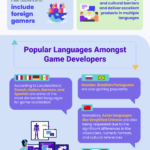You’re looking for a job in game localization, but you don’t know how to get started? This blog post will teach you everything you need to know. It’ll tell you about the skills you’ll need, and it’ll show you what it takes to land a job in this industry. With dedication and passion, you can become a game translation professional in no time!
Estimated reading time: 9 minutes
Table of contents
- 1) Develop Video Game Localization Job Skills
- 2) Start networking
- 3) Consider an internship
- 4) Consider Freelance Work
- 5) Get involved in the game localization community
- 6) Attend industry events
- 7) Stay up-to-date with industry news
- 8) Brush up on your language translation skills
- 9) Get your portfolio ready
- Conclusion
1) Develop Video Game Localization Job Skills
If you’re wondering how to get a job in game localization, it’s really important to know about all the different stages of the process. You might work in-house or as a freelancer, but it helps to be familiar with technical aspects, translation, localization and transcreation, game localization testing, and game design. We have compiled a blog post for you with the best practices 2023 for Game Localization.
Stages of the Game Localization Process
When you’re a game localization specialist, it’s really important to understand the steps of the process. It might have some extra steps depending on the platform and the size of production. Still, a basic localization process will include
- Content Preparation
- Translation
- Localization
- Engineering
- Audio/Video Editing
- Testing Post-Production.
Differences between Working In-House and as a Freelancer
Working in-house and freelancing are both good options. Working in-house offers more resources, better quality control, consistency, and a paycheck every month. Freelancing gives you more flexible hours, the ability to work with different clients, lots of job opportunities, and more freedom.
Recently, there’s been a big shift from closing down in-house localization departments and outsourcing them to game localization agencies.
The Technical Aspects in Game Localization Jobs
To make a localized version of the game, you have to have a basic understanding of software development kits, hardware requirements, coding languages, game engines, file types, and graphics editors.
Translation, Localization, and Transcreation
Knowing when and how to adapt the source text for different audiences is really important if you want your game to be successful. It’s all about understanding the nuances of language so that you can deliver the best possible version of your game!
Game Localization Quality Assurance Testing
If you want to be a tester for video games, then you’ll need to learn how to fix problems with the game. You’ll have to have at least a basic understanding of localization quality assurance testing and make sure that it runs smoothly without any glitches. Game localization testing services are a great way to train methodically working in translation. It trains translators to ensure that the game content is correctly localized for the target market, enabling them to deliver high-quality localized content.
These services help to identify any potential issues, such as language-specific terms, cultural references, and regional differences in the game. This is essential to ensure that the localized content is accurate and fits the target market. By using game localization testing services, translators can become more methodical in their approach to translation, learning how to identify and solve any potential issues and thus deliver high-quality content. Get started with localization QA testing or LQA.
Game Design
It’s really important to know about game design principles like levels, characters, sound effects, graphical elements, story arcs and dialogues. That way you can make sure your games are as good for the people in other countries as they are for people here.
2) Start networking
Networking is one of the most important parts of how to get a job in game localization. To make a name for yourself, you have to build relationships with people in the gaming industry. Fortunately, there are many ways that translators can network and make connections with those in the gaming industry.
LinkedIn is a good place to make connections with people who work in the gaming industry. You can find game developers and translation companies that are looking for localization professionals on LinkedIn. It’s also a good idea to go to conferences, join online communities, or participate in translation projects, so you can meet other people in the industry!
Lastly, many universities and colleges have events for students to meet with potential employers. This can help you get more details about your career path in video game localization! Keep in mind that game localization is a very specialized area, and those kinds of events normally take place in bigger universities.
3) Consider an internship
In fact, game localization Internships are a great way to get hands-on experience as an editor or translator. They also give you the opportunity to meet people in the game localization industry and make connections that can lead to other opportunities, like getting a job. A game localization Internship is often paid, too, so you’ll be able to earn some money while learning what it’s like in this field! Give it a shot at Indeed.com or reach out to us!
4) Consider Freelance Work
Freelancing can be a great way to get into game localization and learn more about it. There are lots of offers for game translation jobs on websites like UpWork or Fiverr. Freelancing is good because you can contact clients directly or work with translation agencies, which will give you experience. But most importantly, you can boost your portfolio in no time.
Just remember that there are people out there who want to steal your work or don’t want to pay you. Rates for freelance game localization jobs on marketplaces are usually low because there is a lot of competition. Another common misconception is that machine translations make translation jobs easier and that paying translators reasonably is no longer justified.
What we highly discourage you from doing is participating in crowdsourcing efforts. Those are mostly user base exploitation and either offer ridiculously low pay or are scams.
Before taking any offers from online marketplaces, make sure to check who is offering the job, if they are trustworthy, and what other freelancers write about them.
5) Get involved in the game localization community
If you want to get a job in game localization, it’s really important to be involved in the game localization communities. Joining ProZ and Reddit can help you keep up with the latest news and network with professionals who might be able to offer you some advice on how to get a job. Here are some Reddits to get started:
If you’re active on Facebook, check out the Indie Game Localization Facebook Group. While less active recently, it is still a great game translation community. Another FB group we recommend is Indie Game Developers IGD.
These communities are a great way to connect with other people in the localization industry and get help from experts. You can ask questions, participate in workshops or mentoring programs, and find opportunities for freelance work or internships. There are often job postings too!
6) Attend industry events
Industry events are a great way to learn more about the game localization industry. As a game localization professional, you should try to go to as many of these as possible. They can help you expand your network and make connections that will help you find your next job in this field.
One of the major events is LocWorld. These events are also great for learning about the latest tools and trends in the industry, and maybe you can land a game localization job there. So, take advantage of them!
7) Stay up-to-date with industry news
It’s really important to know what’s going on in the game localization industry. Many websites and blogs can tell you all about it, so you can stay up to date. Part of your game localization job, you should subscribe to newsletters, follow experts on social media, and join specialized forums so you know when new jobs are posted, where there will be events happening, and what kind of new technologies could help your career.
Some websites we recommend:
Or check out our blog! We release articles on a weekly basis to keep you as a game translator up to date.
8) Brush up on your language translation skills
To get hired in this industry, you’ll probably have to learn how to use automated translation tools like Google Translate or DeepL. However, to be a successful game localizer, you have to know a lot about the language and you can’t just rely on MTs. You should always stay up-to-date with both written and spoken versions of it. It can help to take general language classes too.
Most clients and game studios do have proofreaders who will test your translation quality. They immediately find out if it’s a high quality translation or a DeepL copy-paste machine translation.
Also, we highly recommend you take ProZ’s courses. While they aren’t for free, we assure you it’s worth your money, and you will gain valuable insights besides supporting your game translator community:
- Video games localization 101 – Introduction to video game localization
- Video games localization 102 – How to localize a video game: first steps
- Video games localization 103 – Creativity in video game localization
- Video games localization 104 – Localization testing (QA)
9) Get your portfolio ready
Portfolios are really important if you want to work in game localization. At the same time, it can be hard to get started. The good news is that having no prior experience in translation can still get you into the industry if you do well on the test. Even if you fail a test, most agencies offer you another chance to retake it at a later stage.
Keep in mind that your portfolio is like a resume, and it can show potential clients what kind of skills you have. You should include examples of your previous projects so they know what you’re capable of. Make sure your portfolio is easy to access, too.
An important aspect most translators overlook, though, is that most game studios and even game localization service agencies want to avoid crediting translators. You need to get approval from your clients before you can add the related project to your portfolio to avoid legal issues.
Conclusion
We hope we can give you an overview of how to get a game localization job. SandVox is always open to your applications, and we want to grow with you. Don’t hesitate to reach out to us, even if you have any questions on how to land a game translation job.






